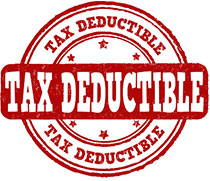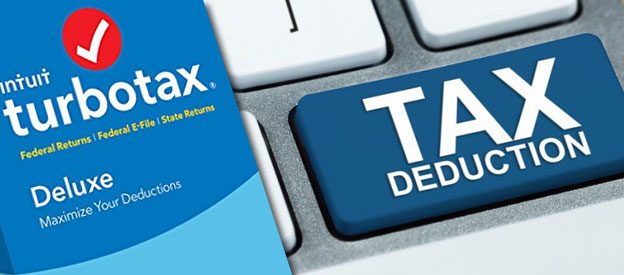Writing off tax preparation fees and the cost of tax prep software like TurboTax: Whether you buy software to file your taxes or pay a professional to prepare them, there’s always expenses involved in filing your taxes.
So, can you deduct the cost of tax software or paying a tax professional from your taxes? The answer is yes, although most people don’t spend enough on tax preparation and other miscellaneous expenses in relation to their income for it to actually work out as a deduction.
Here’s how it works:
Qualifications for claiming tax prep fees as a deduction
To benefit from getting a deduction from your tax preparation fees, you have to meet these two qualifications:
- You have to itemize your deductions
- The total sum of your tax preparation costs, tax prep software, and other miscellaneous expenses must exceed 2% of your adjusted gross income (AGI)
For example, if your AGI is $40,000, 2% would be $800. If your miscellaneous expenses (including tax software or fees paid to a CPA or tax professional) total $1000, then you can only deduct the amount above $800. So your deduction would be $200, not the full amount.
Most people can’t get a deduction from their tax prep expenses, here’s why
Because the total miscellaneous expenses (including tax prep fees) that people claim is usually less than of their 2% AGI, there usually ends up being no actual deduction.
In fact, the average amount that people with itemized deductions pay to file their taxes is only about $300, while the average family income is about $56,000.
Using these numbers (and the 2% threshold) the average family would have to spend over $1,100 on miscellaneous expenses (like the cost of tax software or tax preparation) to realize any actual tax benefit.
If you now realize that the money you spent on tax prep fees or tax software is NOT going to be a write-off for you, it’s just another reason to hate taxes. Or, consider the discounts from the latest Turbo Tax coupon codes and H&R Block software coupon codes to be your tax prep deduction!
However, if you still think you might be able to squeeze a deduction out of your tax prep costs, please read more below.
What kind of tax-prep fees or software costs can I claim?
There are several costs from tax preparation that you can claim. If you decide to have your taxes filed by a professional, or seek help at all, you can add it to your claim. Any professionals you hire, such as tax preparers, advisors, CPA, and lawyers who provide counsel on tax related issues or audits are all costs that can be claimed for your deduction.
The same thing applies if you decide to spend money to file your taxes yourself. You can claim any tax software or tax related literature you purchase, and any additional tax return preparation cost. This includes any money spent on software like TurboTax, H&R Block, or TaxAct. Heck, even the free editions of popular tax software can end up costing you significant money; in some cases over $100, according to Forbes.com. Plus, add in the cost of filing your state taxes, which is about an extra $40!
Anyway, In order to qualify as a potential deduction, your tax prep costs have to be claimed in the same year in which you paid for those professionals or services. So, if you buy tax software to file your 2016 taxes, you will claim it with your 2017 taxes.
When it comes down to it, just about any cost incurred from preparing and filing your taxes can be added to your itemized deduction claim of miscellaneous expenses. (Just don’t try to claim the bottle of vodka you drank during the filing process to calm your nerves!)
Related: You can deduct the cost of software like TurboTax Self-Employed (review), TurboTax Premier (review), and H&R Block Self-Employed (review).
Itemized deductions: employee expenses, tax prep expenses, & other miscellaneous expenses
 When filing taxes, you have the choice between filing itemized deductions or standard deductions. Standard deductions are a set amount based on your filing status, determined by criteria such as your marital status and family situation. Itemized deductions on the other hand, reflect your actual spending. If your itemized deductions come out to more than your standard deductions, you will pay less in federal taxes.
When filing taxes, you have the choice between filing itemized deductions or standard deductions. Standard deductions are a set amount based on your filing status, determined by criteria such as your marital status and family situation. Itemized deductions on the other hand, reflect your actual spending. If your itemized deductions come out to more than your standard deductions, you will pay less in federal taxes.
Besides the cost of preparing your taxes, other miscellaneous expenses include any unreimbursed employee expenses. These expenses might include:
- Work-related classes
- Professional journal subscriptions
- Job-related legal fees and licenses
- Job-related uniforms
- Home-office expenses directly related to your job including printer ink or depreciation on personal computers used for work
When tax time comes and you’re gathering your deductions, add up all of these miscellaneous expenses along with your tax preparation expenses to determine whether it will work out as a deduction. As long as you itemize your deductions, and your total expense claims surpass 2% of your adjusted gross income, then your tax prep costs will be a tax benefit. It’s also a good idea to use of the best free tax refund calculators online well before filing your taxes to estimate what kind of refund or bill you’re going to get.


